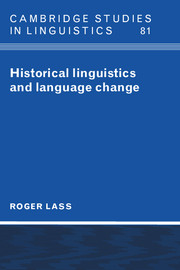Book contents
- Frontmatter
- Contents
- Preface
- Conventions, abbreviations and symbols
- General prologue: time travel and signal processing
- 1 The past, the present and the historian
- 2 Written records: evidence and argument
- 3 Relatedness, ancestry and comparison
- 4 Convergence and contact
- 5 The nature of reconstruction
- 6 Time and change: the shape(s) of history
- 7 Explanation and ontology
- References
- Index of names
- Subject index
2 - Written records: evidence and argument
Published online by Cambridge University Press: 05 June 2012
- Frontmatter
- Contents
- Preface
- Conventions, abbreviations and symbols
- General prologue: time travel and signal processing
- 1 The past, the present and the historian
- 2 Written records: evidence and argument
- 3 Relatedness, ancestry and comparison
- 4 Convergence and contact
- 5 The nature of reconstruction
- 6 Time and change: the shape(s) of history
- 7 Explanation and ontology
- References
- Index of names
- Subject index
Summary
What song the Syrens sang, or what name Achilles assumed when he hid himself among women, though puzling Questions are not beyond all conjecture.
(Sir Thomas Browne, Hydriotaphia, Urne Buriall, V)Prologue
The first-order witnesses to the more distant linguistic past are written texts: inscriptions, manuscripts, printed books. This fundamental importance however does not imply ease of interpretation. Even after preliminaries like decipherment of unknown scripts, etc. we still have to determine the relation of a given writing system to what it (apparently) encodes, in particular the phonic substance and the level(s) of structure it might be said to represent. And this may not be at all straightforward.
But there are still enormous difficulties, partly because of uncertainties about the nature of documents or texts themselves. How far are they ‘representative’ of ‘languages’, and in what way(s)? How do we separate the variations we find in non-codified traditions from genuine scribal error, distinguish evidence from garbage? How do we decide, in the case of dead languages, what meanings and structures ought to be assigned to the items in a text, regardless of their phonetic interpretation? How do we arrive at the meanings of lexical items or grammatical forms in languages no longer spoken, and lacking, unlike Latin or Greek in the West, or Sanskrit in India, a subsequent preservative or antiquarian tradition?
- Type
- Chapter
- Information
- Historical Linguistics and Language Change , pp. 44 - 103Publisher: Cambridge University PressPrint publication year: 1997



